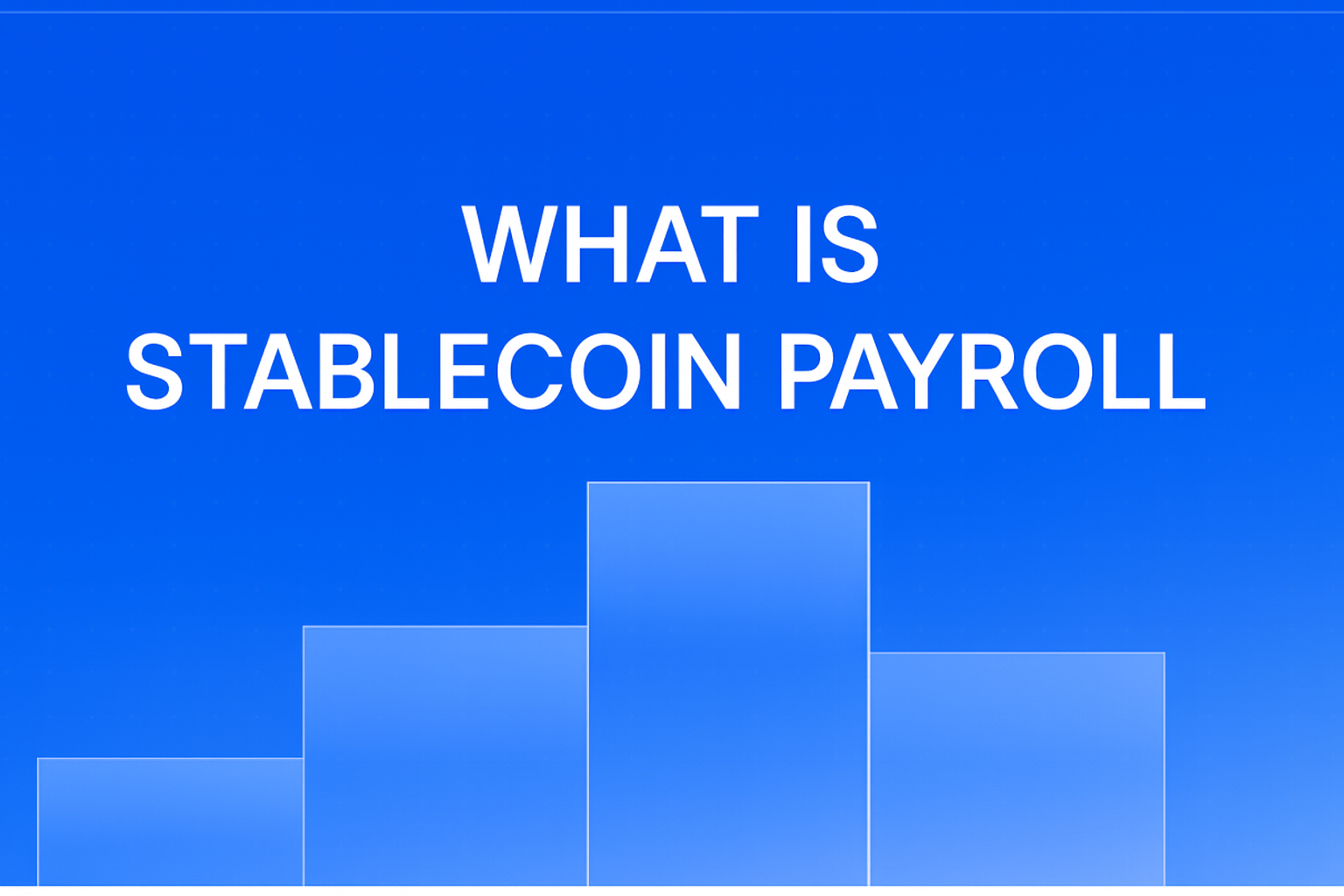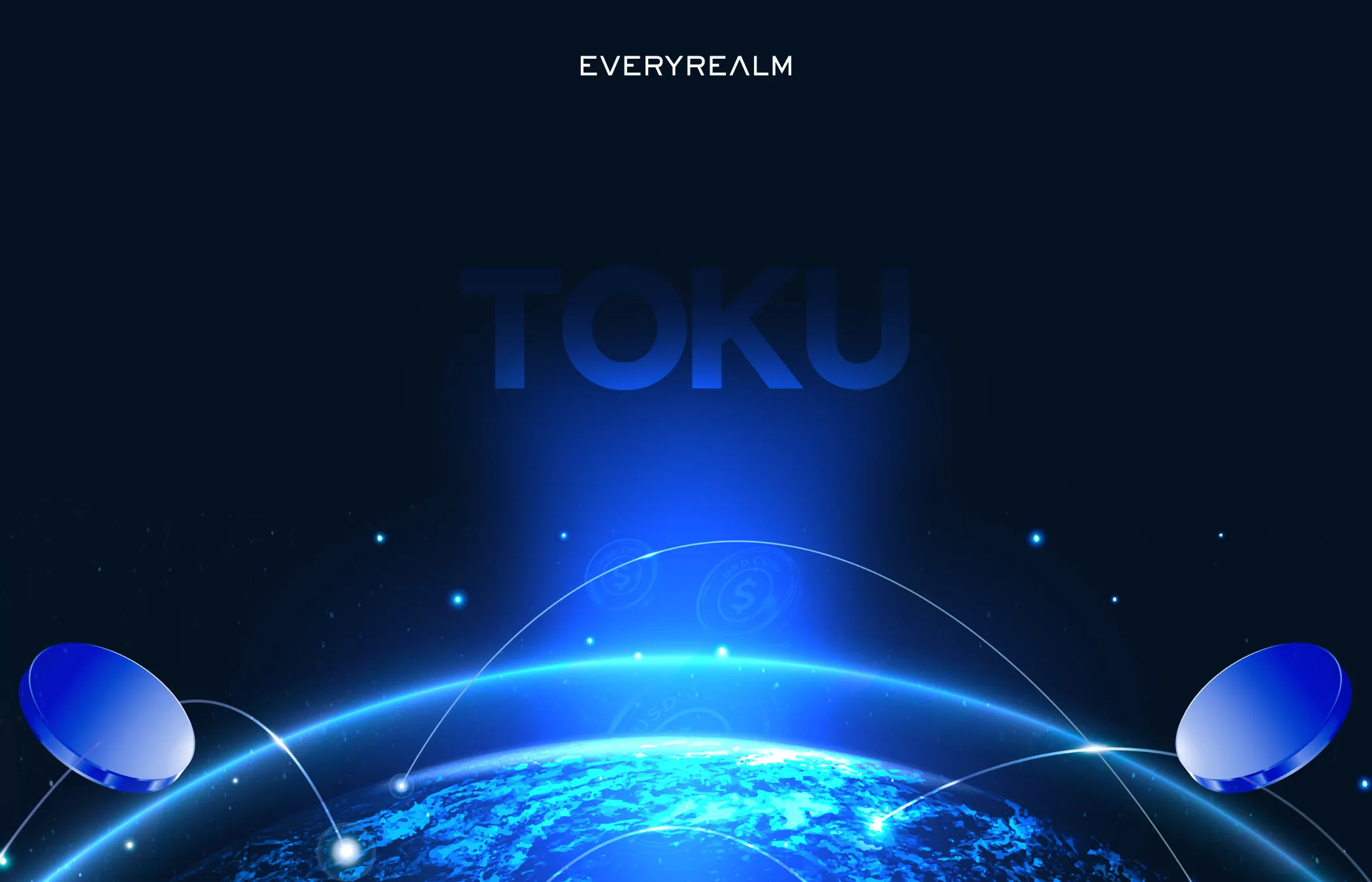
What is Stablecoin Payroll? A Beginner’s Guide for Global Companies
Learn how stablecoin payroll works, why it’s faster and more compliant than traditional methods, and how global teams use it with Toku.

.avif)
For most companies, payroll hasn’t changed in decades. Even as fintech revolutionized banking, payments, and accounting, payroll operations have remained slow, fragmented, and heavily dependent on intermediaries.
Cross-border payments can take days to settle. FX conversion fees quietly erode margins. And for distributed teams, reconciling payroll data across countries and banking systems is a constant administrative burden.
That’s why a growing number of finance and HR leaders are exploring stablecoin payroll — a faster, more transparent way to pay global teams using blockchain-based digital dollars such as USDC or PYUSD.
Unlike traditional crypto assets, stablecoins are pegged 1:1 to fiat currencies, meaning their value doesn’t fluctuate wildly. The result is a form of payment that combines the stability of the dollar with the speed and efficiency of blockchain technology.
In simple terms, stablecoin payroll allows companies to send instant, low-cost, and fully traceable payments to employees and contractors anywhere in the world — while staying compliant with labor and tax laws.
But there’s still confusion:
- How does stablecoin payroll actually work?
- Is it legal and safe?
- And how can companies adopt it without overhauling their existing payroll systems?
This beginner’s guide breaks it all down. We’ll explain what stablecoin payroll really means, how it fits into global compliance frameworks, and how solutions like Toku make it possible to integrate blockchain-powered payments directly into tools such as ADP, Workday, and Gusto — without disruption.
What Exactly Is Stablecoin Payroll?
At its core, stablecoin payroll is a modern payment method that allows companies to pay employees or contractors using stablecoins — digital currencies designed to maintain a stable value by being pegged to traditional currencies like the U.S. dollar or euro.
Think of it as sending digital dollars over the internet — faster, cheaper, and borderless — but without the volatility or complexity often associated with cryptocurrencies.
Stablecoins: The Foundation
Stablecoins such as USDC, USDT, and PYUSD are issued by regulated financial entities and backed by real-world reserves (like cash or short-term treasuries).
Each token represents one unit of fiat currency, making it redeemable 1:1 for cash.
This stability is what makes stablecoins uniquely suited for payroll:
- No volatility risk — unlike Bitcoin or Ethereum, the value remains constant.
- Instant transferability — funds can move across borders in seconds.
- Full transparency — every transaction is recorded on the blockchain, creating an immutable audit trail.
For companies, stablecoins combine the best of both worlds — the trust of traditional finance and the efficiency of decentralized networks.
How Stablecoin Payroll Differs from “Crypto Payroll”
Traditional “crypto payroll” often refers to paying employees in volatile tokens like Bitcoin or Ethereum. While innovative, these payments are unpredictable in value — a $5,000 salary could drop to $4,200 overnight.
That volatility makes it impractical for large-scale or compliant payroll operations.
Stablecoin payroll, on the other hand:
- Is value-stable and easily convertible to fiat.
- Can be integrated into existing payroll systems through APIs (e.g., Toku with ADP or Workday).
- Provides compliance-ready documentation in fiat equivalents for accounting and tax purposes.
In other words, it’s not about “crypto pay” — it’s about using regulated digital dollars to make payroll more efficient, compliant, and accessible for global teams.
Who It’s For
Stablecoin payroll isn’t just for blockchain startups anymore.
It’s gaining traction among:
- Global SaaS and fintech companies paying remote teams.
- Enterprises experimenting with faster, cross-border treasury management.
- Freelancer-heavy organizations looking to simplify international payments.
With infrastructure providers like Toku, companies can now enable stablecoin payroll without replacing their current payroll stack — making this innovation both practical and compliant from day one.
How Stablecoin Payroll Works
Stablecoin payroll sounds complex, but the mechanics are surprisingly simple — especially when it’s built to work with your existing payroll systems.
Instead of replacing what’s already in place, Toku acts as a compliant infrastructure layer that enables companies to execute blockchain-based payments in parallel with traditional payroll operations.
Here’s what the full process looks like from start to finish.
Step 1: Payroll Runs as Usual
The finance or HR team continues to run payroll through familiar systems such as ADP, Workday, or Gusto.
Employee and contractor payment data — including names, roles, currencies, and pay amounts — are processed exactly as before.
No new tools. No workflow changes.
Step 2: Toku Integrates via API
Toku connects securely to the payroll platform via API, reading all relevant payment data while keeping sensitive information encrypted.
This integration allows Toku to identify which employees or contractors have opted in for stablecoin payments, as well as their fiat-equivalent compensation amounts.
Toku doesn’t store payroll data long-term; it acts as a secure transaction bridge, ensuring every payout matches the exact fiat value defined in the company’s payroll system.
Step 3: Conversion to Stablecoins
Once payment details are verified, Toku converts the fiat amounts into regulated stablecoins such as USDC or PYUSD through licensed custodial partners.
This ensures:
- Transparent, auditable conversion rates.
- Fully compliant custody under financial regulations.
- No direct crypto handling by the employer.
Each token represents a verified, 1:1 fiat value — so a $5,000 salary equals $5,000 in stablecoins at the time of payout.
Step 4: Instant Payouts to Recipients
The stablecoins are sent instantly to verified wallets belonging to employees or contractors.
Recipients can:
- Hold stablecoins as digital dollars.
- Convert them into local currency through supported exchanges.
- Use them directly for payments, savings, or DeFi yield options (where allowed).
Transfers settle within seconds, not days — with complete on-chain visibility for both sender and recipient.
Step 5: Compliance, Reporting, and Reconciliation
Once payments are completed, Toku syncs all transaction details — including fiat-equivalent values and timestamps — back into the payroll system.
This ensures:
- Tax and wage compliance remain intact.
- Every payment is accounted for in fiat terms.
- Finance teams retain a unified record for audits and reporting.
Toku also manages KYC, AML, and jurisdictional compliance, ensuring that every transaction meets local and international regulatory standards.
The Result: Seamless Hybrid Payroll
By layering blockchain rails on top of existing infrastructure, companies gain:
- Speed — Instant cross-border settlements.
- Cost savings — 50–70% lower transfer fees.
- Compliance confidence — Fully auditable, fiat-equivalent reporting.
- Flexibility — Employees and contractors can choose how they receive their pay.
Stablecoin payroll doesn’t reinvent payroll — it upgrades it.
It’s the missing link between traditional finance systems and the next generation of global workforce payments.
Key Benefits for Global Companies
Stablecoin payroll isn’t just faster; it’s a structural improvement to how global organizations move money.
For distributed teams, every delayed transfer, foreign-exchange markup, and manual reconciliation translates into friction — friction that stablecoin infrastructure removes almost entirely.
Below are the most important benefits for finance, HR, and operations teams adopting this model.
Speed and Settlement Time
Traditional international payroll relies on intermediary banks that batch and clear transactions over several days.
With stablecoins, funds settle within seconds — 24 hours a day, including weekends and holidays.
Employees and contractors get paid instantly, and finance teams close payroll cycles faster with real-time confirmation.
Cost Efficiency
Wire transfers and FX conversions can consume 3–6 % of every payment.
Stablecoin transactions typically cost under $1, regardless of amount or geography.
Companies using Toku’s infrastructure routinely save 50–70 % on international payroll fees.
Global Reach and Financial Access
Stablecoins move seamlessly across borders and work anywhere with internet connectivity — even in regions with limited banking access.
For global teams, this means talent can be hired and paid directly without waiting to open foreign bank accounts or subsidiaries.
Transparency and Auditability
Every transaction is recorded on-chain, creating a permanent, time-stamped audit trail.
Finance teams gain visibility into the full payment lifecycle — from initiation to receipt — simplifying audits and reconciliations across entities.
Stability and Predictability
Unlike other crypto assets, regulated stablecoins maintain a 1:1 peg to fiat.
That stability allows companies to denominate payroll in USD-equivalent value, eliminating volatility risk while retaining the speed of blockchain settlement.
Compliance and Control
Toku integrates directly with existing payroll systems, enforcing:
- KYC/AML checks for all recipients.
- Jurisdiction-specific tax reporting.
- Secure custody through licensed partners.
This ensures that global payments remain fully compliant and audit-ready — without introducing additional regulatory exposure.
Employee Choice and Flexibility
Modern employees expect flexibility. Stablecoin payroll lets recipients choose whether to:
- Hold stablecoins as digital dollars.
- Convert instantly to local currency.
- Transfer funds globally with minimal cost.
By giving workers more control, companies strengthen satisfaction and retention — particularly among remote and crypto-native teams.
Treasury and Cash-Flow Agility
Because stablecoins settle instantly, finance teams can manage liquidity dynamically.
Funds can be deployed or recalled in real time, improving cash-flow visibility and reducing idle capital tied up in delayed settlements.
Stablecoin payroll doesn’t just modernize payments — it transforms payroll into a real-time financial engine.
When paired with a compliance-first provider like Toku, companies unlock global efficiency while maintaining complete regulatory assurance.







